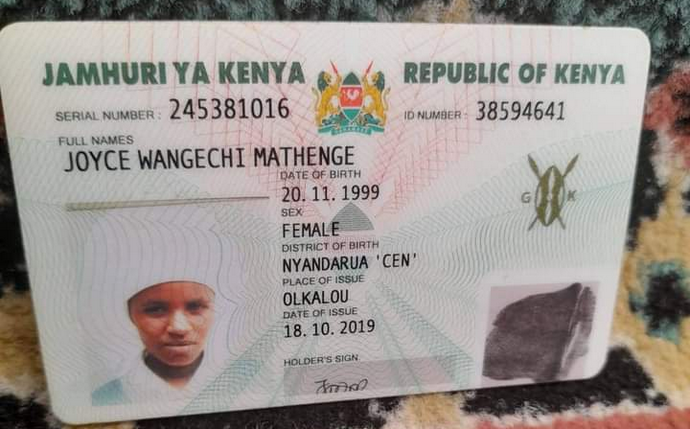
A concerned netizen has sent out an alert to the family of a young Kenyan girl who reportedly lost her life while in search of greener pastures in the Arabian Gulf.
Delivering the message via social media, a source named Thuo Kimani Githuku informed the public that the 23-year-old identified as Joyce Wangechi Mathenge passed on this week in Riyadh, the capital city of Saudi Arabia, under controversial circumstances.
A photo of Ms Wangechi’s Kenyan identity card, which was attached to Mr Githuku’s Twitter post, depicts her native home region as Olkalau Town in Nyandarua County, Central Province.
The context of his viral but unconfirmed tweet made it appear like her family is yet to receive the news of their daughter’s death.
“If you know her family, inform them she passed on in Riyadh,” he noted in part of the post.
“When will our government protect our brothers and sisters working in Arab countries?” he added.
Reports of Kenyan domestic workers in Saudi Arabia suffering physical and sexual abuse, or dying under uncertain factors, have continued to appear in the press.
In July 2021, Labour Cabinet Secretary Simon Chelugui said that since January 2019, the ministry had facilitated the employment of over 87,784 Kenyans in the Middle East, most of them working in Saudi Arabia, Qatar, UAE and Bahrain.
But these young Kenyans are taking risks because states such as Saudi Arabia have an extremely poor record regarding the labour rights and working conditions of domestic workers.
Over the last three years, over 89 Kenyans — half of them female domestic workers — have died in the Gulf nation, according to Kenya’s foreign ministry.
Saudi Arabia relies on the millions of low-paid foreign workers to perform domestic jobs, from housemaids, caregivers and nannies to drivers and security guards.
Over 30% of the oil-rich kingdom’s population of 35 million are migrants, many from Asian and African countries.
But Saudi Arabia — along with other Gulf nations such as the United Arab Emirates (UAE), Kuwait, Bahrain and Oman — has long faced criticism from rights groups for a sponsorship system that leaves migrant workers open to abuse and exploitation.
Under the “kafala” system, a foreign domestic worker’s legal status is tied to their employer and they cannot change jobs or leave the country without permission.
This has led to widespread abuses of migrant workers — from passport confiscation, unpaid wages and excessive work hours, to beatings and even rape by male members of the household.



















